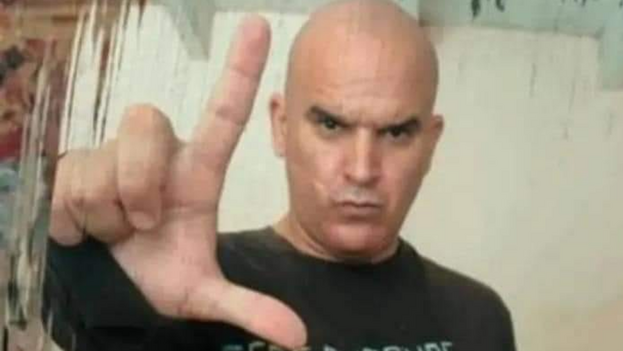
![]() 14ymedio, Havana, 29 November 2022 — On Tuesday, Cuban activist and opponent, Carlos Ernesto Díaz González, known as Ktivo Disidente, was sentenced to two years and six months in prison for disobedience and contempt. Díaz González had spent almost seven months in Ariza prison, in Cienfuegos, after he asked for freedom for political prisoners while standing atop the wall of a playground in the San Rafael boulevard in Havana.
14ymedio, Havana, 29 November 2022 — On Tuesday, Cuban activist and opponent, Carlos Ernesto Díaz González, known as Ktivo Disidente, was sentenced to two years and six months in prison for disobedience and contempt. Díaz González had spent almost seven months in Ariza prison, in Cienfuegos, after he asked for freedom for political prisoners while standing atop the wall of a playground in the San Rafael boulevard in Havana.
The tribunal ratified the request of the Provincial Prosecutor in Cienfuegos, according to a Tweet by El Toque Jurídico, for “standing on a wall and protesting.” In July, authorities denied the 10,000 peso bail for the opponent, at the request of the prosecutor.
According to Manuel Gómez, a friend of Díaz González interviewed by Diario de Cuba, the tribunal systematically violated the judicial procedures to which the activist was entitled.
After enduring mistreatment, confinement in a punishment cell and several hunger strikes, Díaz González demanded that he be classified as a political prisoner, refusing to use the same uniform as common prisoners.
“The fact that Ktivo is being accused of contempt and disobedience complicates the denouncements of his case,” predicted attorney Eloy Viera Cañiva in an article published on Tuesday. This charge, he explained, doesn’t force the prosecutor to provide a “provisional conclusions” document, which provides a record of the facts of the case against the defendant and lists the evidence.
In the absence of this obligation, and as such the document, human rights organizations are denied access to the information they need to demonstrate that it is an unjust sentence.
“In the case of Ktivo (as in that of many political prisoners that have been tried via what was once called a summary procedure) secrecy has prevailed,” denounced Viera, who also bemoans that that observers and the press were not allowed at the trial.
Cubalex has also complained that while the activist faces two and a half years in prison, the officialist singer-songwriter, Fernando Becquer, accused of sexual abuse by about thirty women, received five years without internment and “is on the street running errands.”
Carlos Ernesto Díaz González protested on December 4, 2020 asking for the release of Luis Robles, known as “the young man with the placard.” Later, he joined Archipiélago and was arrested in November 2021, the eve of the Civic March for Change, for putting up protest posters in Cienfuegos.
His entry into prison finally occurred following a protest on the San Rafael boulevard in April of this year, when he yelled, “There doesn’t have to be violence, there doesn’t have to be bloodshed, but they must let us participate in the country’s political life. Whoever is communist can be so, but he who is not should be respected,” while passersby recorded on their cellphones. Finally several officials brought him down from the wall and drove him to a police station. Shortly after, he was transferred to Cienfuegos.
Translated by: Silvia Suárez
____________
COLLABORATE WITH OUR WORK: The 14ymedio team is committed to practicing serious journalism that reflects Cuba’s reality in all its depth. Thank you for joining us on this long journey. We invite you to continue supporting us by becoming a member of 14ymedio now. Together we can continue transforming journalism in Cuba.
